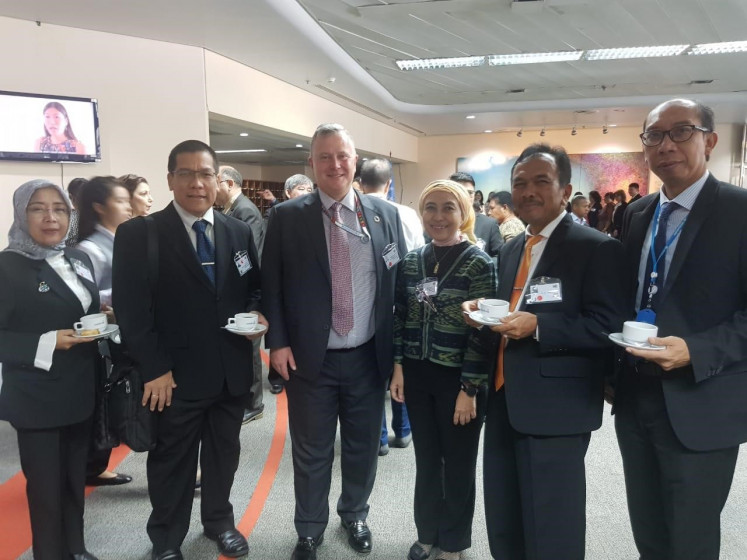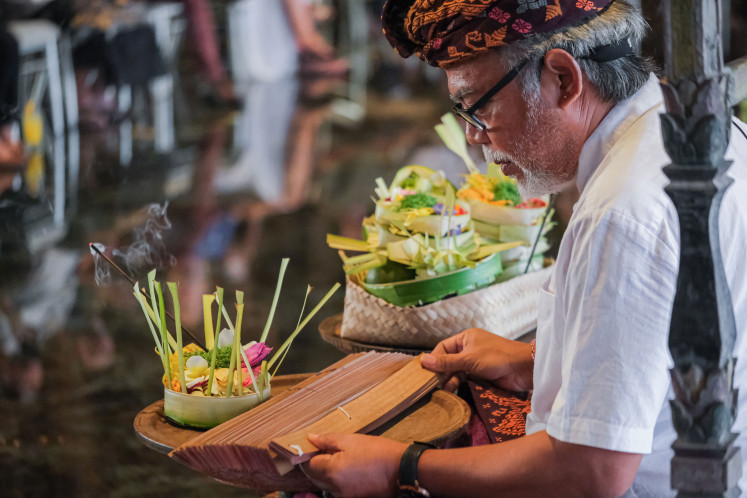Indonesia reaffirms its strong position among south-south countries
Change Size
 Indonesian delegation chief and National Population and Family Planning Agency (BKKBN) principal secretary H. Nofrijal delivers his speech during the United Nations Economic and Social Commission for Asia and the Pacific (ESCAP) assembly in Bangkok, Thailand, on Nov. 26.
Indonesian delegation chief and National Population and Family Planning Agency (BKKBN) principal secretary H. Nofrijal delivers his speech during the United Nations Economic and Social Commission for Asia and the Pacific (ESCAP) assembly in Bangkok, Thailand, on Nov. 26.
F
or the recent United Nations Economic and Social Commission for Asia and the Pacific (ESCAP) assembly, which was held from Nov. 26 to 28 in Bangkok, Thailand, the Indonesian delegation chief H. Nofrijal had convinced delegates from 50 other Asia-Pacific countries to appoint Filipino delegate Juan Antonio Perez III to be the assembly’s chair.
With its slogan “70 years of connecting Asia and the Pacific”, the ESCAP is the regional socio-economic development arm for the Asia-Pacific region.
Nofrijal, who also serves as the National Population and Family Planning Board’s secretary-general, said the Indonesian delegates supported Perez for his expertise on the issue of development and population, both highly pressing issues in Indonesia. Perez also serves as the executive director of the Philippines’ Commission on Population.
The assembly’s vice chairs are Afghanistan’s Abdul Naeem and Fiji’s Yosefa Korovuito, both of whom have doctoral degrees in the field of socio-economic development. The results of the assembly are to be presented at the upcoming 52nd UN Commission on Population and Development assembly from April 1 to 5, 2019 in New York, the United States, as well as at the 75th global ESCAP assembly in May 2019, also to be held in New York.
The Asia-Pacific is home to 4.1 billion people, two-thirds of the world’s population, and it is made up of 53 member states and nine associate members, with a geographical scope that stretches from Turkey in the west to the Pacific Island nations of Kiribati in the east, in addition to the Russian Federation in the north to New Zealand in the south.
Due to the size of the Asia-Pacific region itself, ESCAP has become the most comprehensive of the UN’s five regional commissions, in addition to being the largest UN body serving the Asia-Pacific region with more than 600 staff members.
Established in 1947 with headquarters in Bangkok, the ESCAP works to overcome some of the region’s greatest challenges by providing result-oriented projects, technical assistance and capacity-building programs to its member states in the following areas:
- Macroeconomic policy, poverty reduction and financing for development;
- Trade, investment and innovation;
- Transportation;
- Environment and development;
- Information and communications technology, as well as disaster risk reduction;
- Social development;
- Statistics;
- Subregional activities for development; and
- Energy.
ESCAP promotes rigorous analysis and peer learning in its core areas of work before translating its findings into policy dialogues and recommendations to provide good development practices, knowledge sharing and technical assistance to member states in their implementation of these recommendations. The organization uses its convening power to bring countries together to address issues through regional cooperation.
ESCAP also provides a forum for its member states to promote regional cooperation and collective action in pursuit of the 2030 Agenda for Sustainable Development and its sustainable development goals (SDGs) through the pursuit of economic growth and equity. Furthermore, ESCAP also gives stronger participation to the smaller and often left-out voices of the region, the least developed countries, the small island developing states and the landlocked developing states.
In carrying out its activities, ESCAP is strengthened by its more than 50 years of experience as a regional think tank. The organization finds its biggest challenge in attempting to bring together the region’s 680 million poor people into the economic mainstream to enable everybody to achieve a better standard of living as envisaged in the charter of the UN.
The three-day assembly in Bangkok sought to be a new strategic milestone in ESCAP’s career in socio-economic development.
Furthermore, the assembly also served as an opportunity to evaluate the implementation of the resolutions formulated 24 years ago during the International Conference on Population and Development in Cairo, Egypt, according to ESCAP Executive Secretary Armida Salsiah Alisjahbana, also an economics professor at the University of Padjajaran in Bandung, West Java.

The conference, held in September 1994, was attended by representatives from 179 UN member countries, Indonesia included.
Armida added that in the 24 years after the Cairo conference, the Asia-Pacific countries had witnessed various new emerging problems: its aging population, the emergence of the productive age cohort and rapid population growth.
Armida, who from 2009 to 2014 served as Indonesia’s national development planning minister, added that although Indonesia had recently seen an increase of its middle class populace, but the region was still struggling with a high poverty rate.
The region’s biggest obstacle to achieving the 2030 SDGs, she asserted, was its high socio-economic inequality, which hampered the disadvantaged populace’s access to social services. She also pointed to gender inequality in terms of job opportunities: Among members of the productive age cohort whom ESCAP had surveyed across 33 Asia-Pacific countries, female workers had 21 percent less access to job opportunities than their male counterparts.
Besides Nofrijal and Armida being there, the three-day assembly was also attended by representatives from various Indonesian institutions that concern themselves with development and population issues, such as the prominent Indonesian Planned Parenthood Association and the Indonesian chapter of the UN Population Fund (UNFPA).
The assembly also featured speeches by high-level delegates such as UNFPA New York managing director Laura London and Thailand’s Foreign Affairs Minister Vijayat Isarabakti. Besides the issues of aging population and socio-economic inequality, the region also faces huge problems related to non-communicable diseases, such as obesity, diabetes and their corresponding cardiovascular diseases. About 76 to 83 percent of the diseases’ total prevalence rate, according to regional research findings, have been caused by unhealthy lifestyles associated with the region’s gradual transition into a more industrialized society.
The assembly’s delegates also addressed their own national issues. Iran, for example, recently faced some problems in the transition of its demographics from a productive age cohort into an aging population. In Cambodia, meanwhile, the country’s growing teenage population is facing a problem regarding proper reproductive health education.
The Indonesian delegates in particular claimed in their statement that 24 years after the 1994 Cairo ICPD, Indonesia had already achieved significant improvements in the areas of birth control, reproductive health, gender equality and population control. The country’s total fertility rate, for instance, has already declined over the years to 2.4 children per mother, thanks to a supposed increase in the use of contraceptives. Indonesia is striving to mainstream its family planning program to villages and remote areas to maximize its implementation across the nation.









